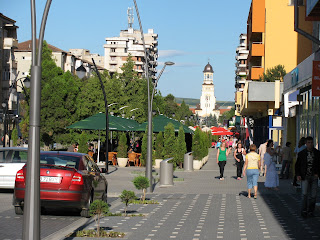Among the garbage and the flowers. Toronto streets have been getting unheralded summer detritus ornaments for a week now. And the sun pours down like honey. And it all spills onto the sidewalk.
Guy next door, as usual when details of the benefits of unionized gangs are disclosed in the news, offered no opinion other than to say "it stinks". Us Toronto taxpayers, mortals who effectively pay a handsome rent just to stay in our own homes, we prove to be a generous and stoic bunch. (And kudos to the folks in Windsor!) Notwithstanding the high taxes that go towards the many unions and the few services, this is not really much of an inconvenience.
Torontonians already spend a good time faithfully screening, sorting, bagging, dragging their oversized multi-coloured bins back and forth, and once in a while visiting the Drop-off Depot for special occasions. We know caulking tubes don't go in the Blue Bin but in the Gray One. Catheters are rinsed, double-bagged, and go into the Gray Bin. Oversized items are put 0.5 m away from the Garbage Bin, toilet tanks first removed from the bowl. Cheese paper, but not chewing gum, goes into the Kitchen Container and then is reassigned to the Green Bin. Kitty litter goes into the Green Bin, pet fur into the Gray Bin. Dead animals are not accepted by the City. (So to get rid of a pesky pet, doing away with it first will get you nowhere.) The circumference of our bundled brunches (no Bin here) never exceeds 0.6 cm. And we all know what to do in case there is excess Green Bin material.
The last step, hauling the accumulated rubble away to transfer stations and scuffling with the picketers, is a natural progression. I'm confident debris scientists are busy applying for government grants right now in their quest to discover new ways to torment us.
And she feeds you tea and oranges, that come all the way from China. With all this intensive debrial (debriferous?) activity and the odiferous litter piling up, I could not help pondering on the reasons there is so much garbage stuff in the first place.
It is, of course, because there is so much stuff.
The Story of Stuff tells us as much. Of the stuff, by the stuff, and for the stuff.
Deliberately a bit rough, a bit too instructional (reminiscent of a high-school lecture, Annie Leonard the stern teacher;
Will this be on the exam?), and not as in-your-face strong as
The Corporation. But the documentary is a nice overview of a big problem, and it's not merely for those pure raucous sanctimonious souls who are trying, a bit too hard, to save the planet (as we all were once). It makes the fashionable
frugal even cooler, and more pertinent.
This story of stuff (21 minutes long) is divided conveniently (as you cannot rewind) into seven parts: Intro, Extraction, Production, Distribution, Consumption, Disposal, and Another Way. You'll learn quite a few things along the way: shoe buffing (the Corporation is bigger than the Government), the need for more planets. Synthetic chemicals (100,000 of these), such as the
BFRs in your pillow, and the need to find a better way to prevent our heads from catching fire at night. Breast is (still) best (but we kinda suspected that much). Whole communities getting wasted (
sic). Low lower lowest prices at Big Box-Mart and externalized costs. Consumption as a way of life. Designed for the dump (planned obsolescence) and skinny heels (perceived obsolescence), as 99% of the stuff we buy is trashed within just six months. Working, shopping, and the national happiness. And, sure enough, garbage. Brought to you by the letter G.
But really, yes, stuff is bad. The System, it stinks. It is high time to switch to
something else entirely.
 Meanwhile, in Toronto it was just cold.
Meanwhile, in Toronto it was just cold.































